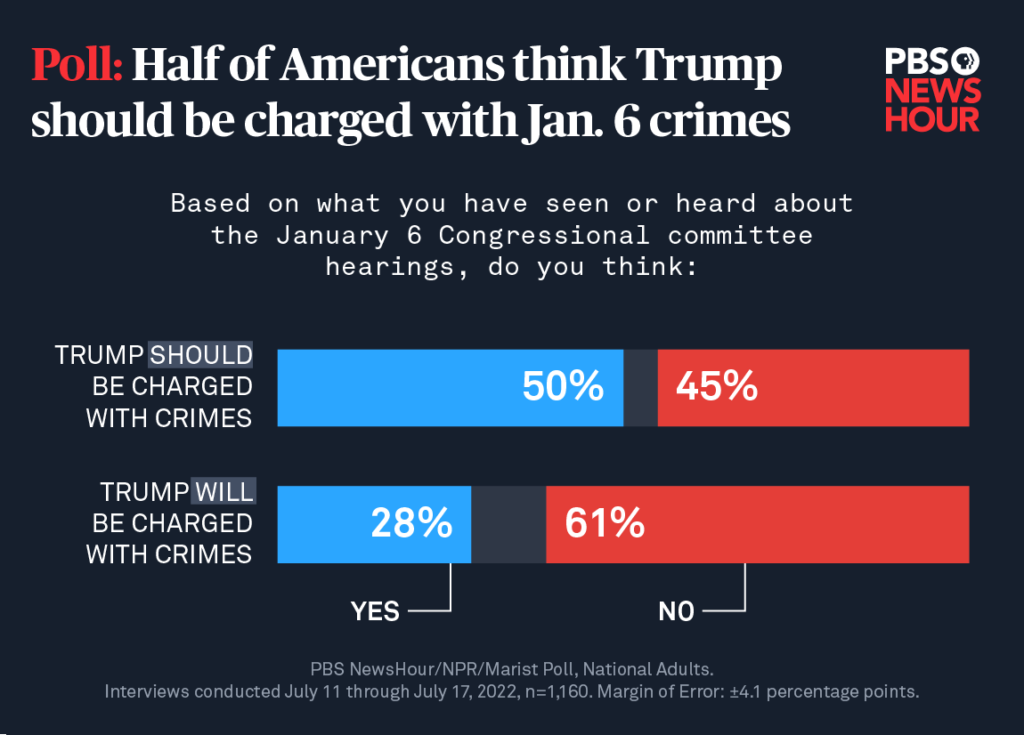Former President Trump was indicted Tuesday by a Washington grand jury on charges stemming from his efforts to remain in power after losing the 2020 election.
The 45-page indictment from special counsel Jack Smith puts Trump at the center of a lawless campaign to block the transfer of power, charging him with conspiracy to defraud the U.S. and other crimes.
At its core, the Justice Department contends Trump embarked on a campaign of “dishonesty, fraud and conceit” to obstruct a “bedrock function” of a democracy — the counting of votes — generating charges for conspiracy to defraud the U.S.

“Despite having lost, the Defendant was determined to remain in power. So for more than two months following election day on November 3, 2020, the Defendant spread lies that there had been outcome-determinative fraud in the election and that he had actually won,” the indictment states.
“These claims were false, and the Defendant knew that they were false,” it continues. “But the Defendant repeated and widely disseminated them anyway—to make his knowingly false claims appear legitimate, create an intense national atmosphere of mistrust and anger, and erode public faith in the administration of the election.”
That lie was the basis for charges on four counts, alleging Trump was the director of a conspiracy to defraud the U.S. and was also central to a campaign to block the certification of votes on Jan. 6.
That campaign spurred charges for obstruction of an official proceeding, the same charge brought against many of those who followed Trump’s Jan. 6 rally call for action and later stormed the Capitol in a deadly rampage.
The indictment also says Trump’s violated the rights of millions of Americans to cast a vote for the candidate of their choice, a right enshrined in the Constitution but further protected from “Conspiracy Against Rights.”
The indictment indicates that Trump will be charged alongside six co-conspirators who, though unnamed, point to a series of close advisers to the former president.
The assertion that Trump knew he lost advances the case beyond was what laid out by the House committee investigating the Jan. 6 attack on the Capitol — an allegation the panel made but was not fully able to prove.
The indictment breaks down a series of incidents in which allies who either supported Trump or “who personally stood to gain by remaining in office” like Vice President Mike Pence, informed Trump that he had lost the election and there was no evidence of widespread voter fraud that could unwind the results.
“Defendant was notified repeatedly that his claims were untrue — often by the people on whom he relied for candid advice on important matters, and who were best positioned to know the facts — and he deliberately disregarded the Truth,” the indictment states.
Title: From N.P. (Nani Palkhivala) to N.P. (Naipaul, V.S.): Observations through the eyes of an overseas citizen of India
Synopsis: The author, an ophthalmologist who has lived abroad (in England and the USA) longer than in India, has visited India more than 120 times since 1977. Each visit was a working vacation to combat avoidable blindness among Indians, especially children. He founded “Eye Foundation of America” in 1979 who is active in India and 21 other developing countries.
As an avid reader of non-medical subjects, he discovered the extraordinary books by Nani and also the books by Nobel Laureate V.S. Naipaul. Nani brought to his readers the best of India and its roots, while also pointing out many shortcomings of present-day India. Naipaul criticizes India (and even its roots) with remarks that are both explosive and cruel.
In spite of their contrasting perspectives, the writings of both N.P. and N.P. contain elements of truth. The author (V.K.R.), while expressing his gratefulness to Mother India for giving him the best medical education almost for free, will attempt to discuss the voluminous historical and philosophical material in these books and to connect them with present-day India.
Finally, the author’s own account, “The Tragedy of Childhood Blindness in India,” illustrates numerous points—the good, the bad, and the ugly—from both Nani and Naipaul.
